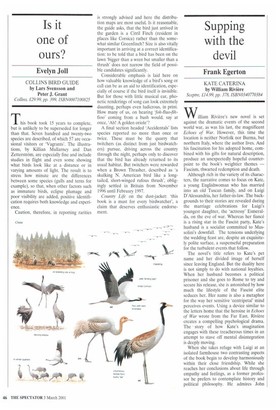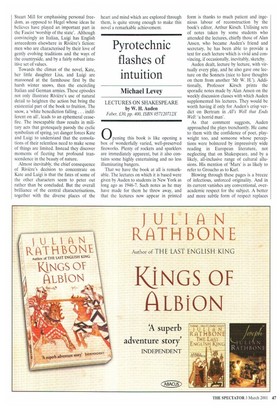Supping with the devil
Frank Egerton
KATE CATERINA by William Riviere
Sceptre, £14.99, pp. 378, ISBN0340770384 William Riviere's new novel is set against the dramatic events of the second world war, as was his last, the magnificent Echoes of War. However, this time the location is neither Norfolk nor Burma, but northern Italy, where the author lives. And his fascination for his adopted home, combined with his gifts for natural description, produce an unexpectedly hopeful counterpoint to the book's weightier themes — Fascism, thwarted redemption and death.
Although rich in the variety of its characters, the narrative comes to focus on Kate, a young Englishwoman who has married into an old Tuscan family, and on Luigi D'Alessandria,, her father-in-law. The backgrounds to their stories are revealed during the marriage celebrations for Luigi's youngest daughter, the `actressy' Esmeralda, on the eve of war. Whereas her fiancé is a rising star in the Fascist party, Kate's husband is a socialist committed to Mussolini's downfall. The tensions underlying the wedding feast are, despite an exquisitely polite surface, a suspenseful preparation for the turbulent events that follow.
The novel's title refers to Kate's pet name and her divided image of herself since leaving England. But the duality here is not simply to do with national loyalties. When her husband becomes a political prisoner and she goes to Rome to try and secure his release, she is astonished by how much the lifestyle of the Fascist elite seduces her. Her name is also a metaphor for the way her sensitive 'centripetal' mind perceives events. Using a device similar to the letters home that the heroine in Echoes of War wrote from the Far East, Riviere creates a compelling psychological drama. The story of how Kate's imagination engages with these treacherous times in an attempt to stave off mental disintegration is deeply moving.
When she takes refuge with Luigi at an isolated farmhouse two contrasting aspects of the book begin to develop harmoniously within their close friendship. While she reaches her conclusions about life through empathy and feelings, as a former professor he prefers to contemplate history and political philosophy. He admires John Stuart Mill for emphasising personal freedom, as opposed to Hegel whose ideas he believes have played an important part in the Fascist 'worship of the state'. Although convincingly an Italian, Luigi has English antecedents elsewhere in Riviere's fiction: men who are characterised by their love of gently evolving traditions and the ways of the countryside. and by a fairly robust intuitive set of values.
Towards the climax of the novel, Kate, her little daughter Lisa, and Luigi are marooned at the farmhouse first by the harsh winter snows, then the encircling Italian and German armies. These episodes not only illustrate Riviere's use of natural detail to heighten the action but bring the existential part of the book to fruition. The snow, a 'white benediction falling. . . indifferent on all', leads to an ephemeral ceasefire. The inescapable thaw results in military acts that grotesquely parody the cyclic symbolism of spring, yet danger forces Kate and Luigi to understand that the consolations of their relentless need to make sense of things are limited. Instead they discover moments of fleeting but profound transcendence in the beauty of nature.
Almost inevitably, the chief consequence of Riviere's decision to concentrate on Kate and Luigi is that the fates of some of the other characters seem to peter out rather than be concluded. But the overall brilliance of the central characterisations, together with the diverse places of the heart and mind which are explored through them, is quite strong enough to make this novel a remarkable achievement.













































































 Previous page
Previous page